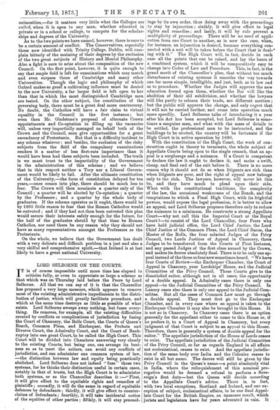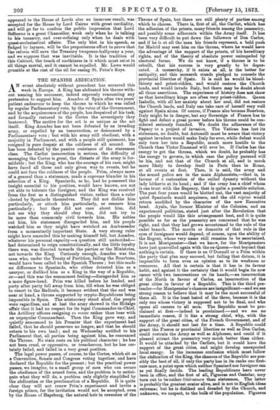LORD SELBORNE ON THE COURTS.
IT is of course impossible until more time has elapsed to criticise fully, or even to appreciate so large a scheme as that which was on Thursday laid before the Peers by Lord Selborne. All that we can say of it is that the Chancellor has proposed a very large measure, which appears to remove most of the existing administrative impediments to the distri- bution of justice, which will greatly facilitate procedure, and which at the same time destroys as little as possible of what exists. Lord Selborne sweeps away nothing, but fuses every- thing. He removes, for example, all the existing difficulties created by conflicts or complications of jurisdiction by fusing the Court of Chancery, the Rolls Court, the Courts of Queen's Bench, Common Pleas, and Exchequer, the Probate and Divorce Court, the Admiralty Court, and the Court of Bank- ruptcy into one great Court, to be called the High Court. This Court will be divided into Chambers answering very closely to the existing Courts, but being one, can arrange its busi- ness so as to meet the suitors, can avoid any conflicts of•jurisdiction, and can administer one common system of law,
—the distinction between law and equity being practically abolished. Lord Selborne does not indeed " fuse " those two systems, for he thinks their distinction useful in certain eases, notably in that of trusts, but the High Court is to administer both systems, or as the Chancellor describes it :—"First, it will give effect to the equitable rights and remedies of plaintiffs ; secondly, it will do the same in regard of equitable defences by defendants ; thirdly, it will give effeet to counter- claims of defendants ; fourthly, it will take incidental notice of the equities of other parties ; fifthly, it will stay proceed- ings by its own order, thus doing away with the proceedings to stay by injunction ; sixthly, it will give effect to legal- rights and remedies; and lastly, it will by rule prevent a multiplicity of proceedings. There will be no need of appli- cation from one Court to another, as is now the case, when, for instance, an injunction is desired, because everything con- nected with a suit will be taken before the Court that is deal-' ing with it." The High Court will, in fact, decide in each case all the points that can be raised, and lay the bases of a combined system, which it will be comparatively easy to change into Codes of Law and Procedure. This, in fact, is the grand merit of the Chancellor's plan, that without too much disturbance of existing systems it smooths the way towards one far more simple, intelligible, and just, both as to law and as to procedure. Whether the Judges will approve the new education forced upon them, whether the Bar will like the abolition of their old subdivision, and whether the lawyers will like partly to relearn their trade, are different matters ; but the public will approve the change, and only regret that it will not be carried further, and come into operation much more speedily. Lord Selborne talks of introducing it a year after his Act has been accepted, but Lord Selborne is some- times a sanguine man, and what with the mass of details to be settled, the professional men to be instructed, and the buildings to be erected, the country will be fortunate if the High Court is in active operation by 1880.
With the constitution of the High Court, the work of con- struction ought in theory to terminate, the whole subject of Appellate Courts being open to the single remark, that an ap- peal is a surplusage and a nuisance. If a Court is competent to declare the law it ought to declare it, and make a swift, cheap, and final end of the suit before it. There is no more reason why it should not do so when litigants are rich than when litigants are poor, and the right of appeal now belongs only to the rich. The lawyers, however, will never let this be, and they have much to plead upon their side. What with the constitutional traditions, the complexity of the law, the occasional weaknesses of the Bench, and the temptations to which a Final High Court, with its frightful powers, would expose the legal profession, it is better to allow an appeal, and Lord Selborne proposes therefore only to reduce the nuisance to a minimum. He constructs a strong Appellate Court—why not call this the Imperial Court or the Royal Court I—to consist of the Lord Chancellor, four Peers who have held judicial office, the Lord Chief Justice, the Lord Chief Justice of the Common Pleas, the Lord Chief Baron, the Master of the Rolls, the four salaried Judges of the Privy Council, two Lords Justices of Appeal in Chancery, three Judges to be transferred from the Courts of First Instance, and any passed Judges of the first class named by the Crown, and makes its decree absolutely final. There is to be only one ap- peal instead of the three or fournow sometimes heard. "We have four Courts of Review—the Exchequer Chamber, the Court of Appeal in Chancery, your Lordships' House, and the Judicial Committee of the Privy Council. These Courts give to the dissatisfied suitor, although not in all cases, the opportunity of a double appeal. In Admiralty cases there is only one appeal—to the Judicial Committee of the Privy Council. In Lunacy cases also there is only one appeal to the Judicial Com- mittee. But all the oases of Common Law must go through a double appeal. They must first go to the Exchequer
Chamber, and in every case where an appeal is taken to the Exchequer Chamber it may also be brought to this House. It
is not so in Chancery. In Chancery cases there is an option generally for the appellant either to come to this House or, if he prefers it, to a Court of Appeal in Chancery, but every judgment of that Court is subject to an appeal to this House.
Therefore, there is generally a system of double appeal for the suitor." The appellate jurisdiction of the House of Lords ceases to exist. The appellate jurisdiction of the Judicial Committee of the Privy Council, so far as regards England in all affairs not ecclesiastical, ceases to exist. And the appellate jurisdic- tion of the same body over India and the Colonies ceases to exist in all but name. The decree will still be given by the Privy Council in the Queen's name—a point absolutely vital in India, where the relinquishment of this nominal pre- rogative would be deemed a refusal to perform a Sove- reign's first duty—but the Queen will decide according to the Appellate Court's advice. There fa, in fact, with two local exceptions, Scotland and Ireland, and one ex- ception of subject, ecclesiastical affairs, to be one final Appel-
late Court for the British Empire, an immense result, which jurists and legislators have for years advocated in vain. It
appeared to the House of Lords also an immense result, was ' accepted for the House by Lord Cairns with great cordiality, and will go far to confirm the public impression that Lord Se'borne is a great Chancellor, weak only when he is talking to his tenantry, and over-refining only when he deals with quasi-ecclesiastical affairs. The only blot in his speech, as judged by laymen, will be the preposterous effort to prove that the reform will save the Treasury twopence-halfpenny a year, and we suppose that was inevitable. It is the tradition of this Cabinet, the touch of earthiness in it which must exist in all things mortal, and it cannot be expelled. Mr. Lowe would grumble at the cost of the oil for easing St. Peter's Keys.



































 Previous page
Previous page